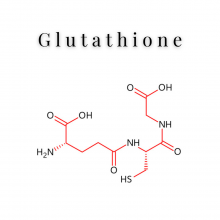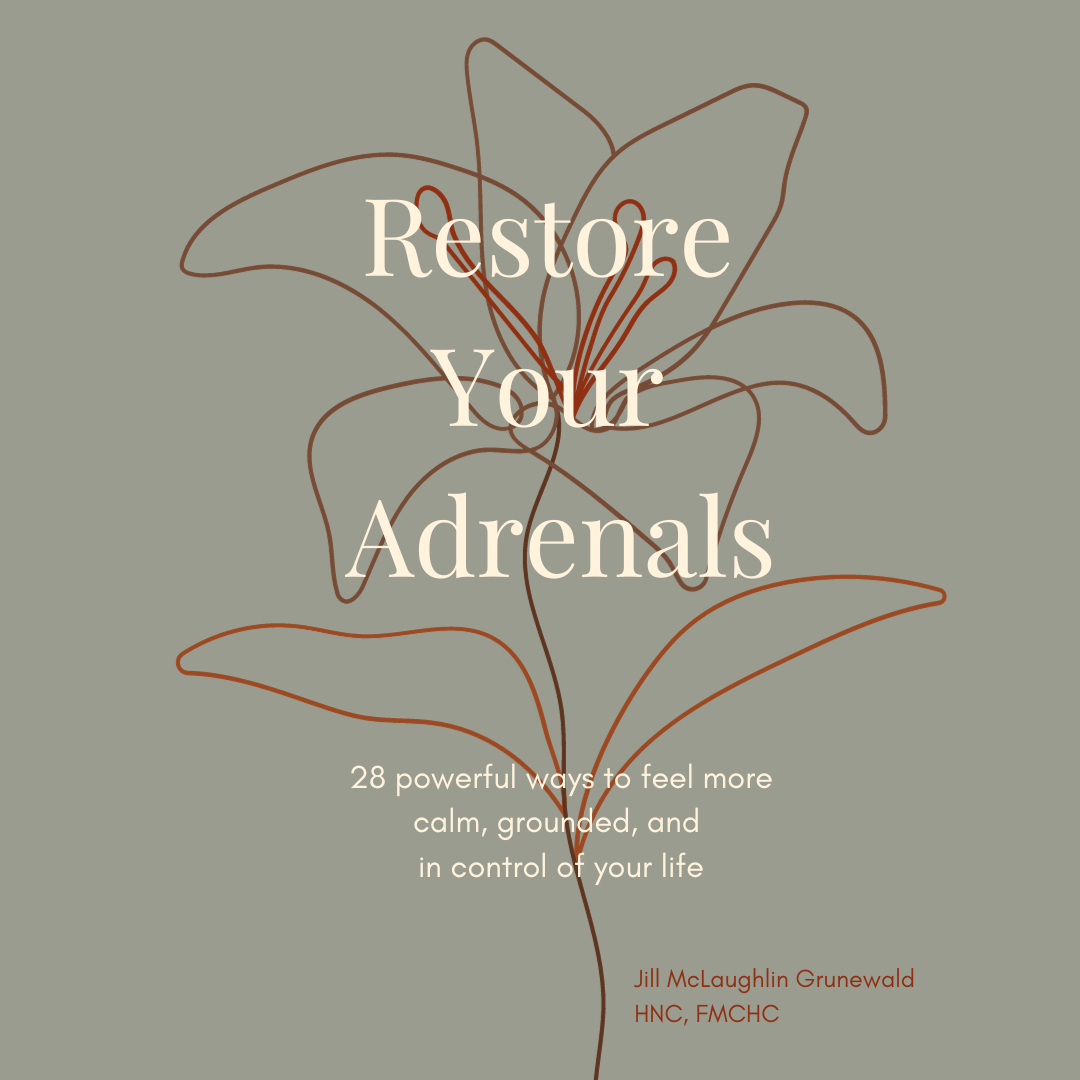Glutathione: Ultimate Immune Guardian

Glutathione is a powerful immune-boosting, cancer-fighting, autoimmunity-taming antioxidant that many experts are just coming around to fully understanding.
It’s the second most abundant molecule in the body (just behind water) and has been named “the master antioxidant” as well as “the mother of all antioxidants.” (Antioxidants protect us from free radicals, which are unstable molecules that harm cells and play a role in premature aging and the development of many diseases like cancer and heart disease. Not good.)
A deficiency of glutathione is not only an indicator of poor health, but it’s also a foundation for declining health, including potential for the onset of autoimmune disease.
If you have an autoimmune condition, many functional medicine experts state that glutathione is one of THE pillars in fighting it.
If this all weren’t impressive enough, it also:
- Tames inflammation
- Fights allergies
- Protects and heals thyroid tissue
- Detoxes the liver
- Protects the brain
- Helps to regenerate the gut lining
- Protects our mitochondria
- Supports detoxification of mold/mycotoxins
- Again, neutralizes free radicals
Speaking of free radicals, when these thugs begin to destroy the body’s tissues, glutathione will absorb the attack, sparing tissue and minimizing destruction.
Dr. Datis Kharrazian states, “Glutathione is like the bodyguard or Secret Service agent whose loyalty is so deep that she will jump in front of a bullet to save the life of the one she protects. When there is enough of the proper form of glutathione in the body to ‘take the bullet,’ no inflammatory response occurs. However when glutathione becomes depleted it triggers a destructive inflammatory process.”
And get this. Glutathione then gets recycled so it’s ready for action again. Talk about the ultimate bodyguard!
Dr. Kharrazian continues, “The overall effect [of glutathione recycling] is to dampen both the autoimmune reaction and damage to body tissue.” More on recycling below.
How to get it
Glutathione is made from amino acids (cysteine, glycine, and glutamate) and my understanding has always been that there are no foods that specifically contain it, although if you look online, there are claims that there are. According to many experts, these supposed “dietary sources” don’t make glutathione readily available to the body—it’s not easily absorbed.
No worries, because there are foods that help your body make it. These glutathione-producing foods include:
- Asparagus
- Okra
- Broccoli *
- Avocado
- Spinach *
- Squash
- Grapefruit
- Peaches *
- Garlic
- Onions
- Kale *
- Collard greens *
- Cabbage *
- Cauliflower *
- Watercress *
- Turmeric
Sulfur is essential in the production of glutathione and the cruciferous vegetables listed above (broccoli, kale, cauliflower, collards, cabbage, watercress) are notoriously rich in this DNA-protecting mineral, as are foods in the allium family (garlic, onions). Additionally, raw eggs and fresh, unprocessed meats contain high levels of sulfur-containing amino acids.
* These foods are considered “goitrogens,” which have historically been thought to inhibit thyroid function. According to new research, this is only the case for those with non-autoimmune hypothyroidism (only about 3-5% of those with low thyroid function). You can read more about the findings here.
What about glutathione supplementation?
Yes, there are plenty of glutathione products out there and for people with autoimmunity, it’s often recommended.
Quality and bioavailability matter. And S-acetyl glutathione from Designs for Health is the only glutathione product I’ve suggested for a few years, but NAD+ (which is difficult to find as a supplement) along with quercetin make the body make glutathione. In addition to the above list of foods that I’ve shared with clients for years, it’s what I’ve leaned on for several months now. See more below on recommended supplementation.
What causes glutathione depletion?
In addition to:
- Pharmaceuticals (especially Tylenol/acetaminophen, acid blockers, antibiotics, antivirals, and tricyclic antidepressants)
- Lack of sleep
- Smoking
- Alcohol
- Pollution
- Radiation
- Unrelenting stress…
…heavy metals are one of the biggest culprits in glutathione depletion. I don’t want to quadruple the length of this post by carrying on about the risks and associations with heavy metals toxicity, especially when there’s one product (yes, one product) that can help bind and remove them. See below.
Supporting glutathione recycling
Including getting plenty of Vitamin C, Vitamin E, and selenium in your diet, which help to recycle and maintain levels, Dr. Kharrazian says that the most important aspect of glutathione recycling is:
- Reducing stressors that are depleting your system
- Balancing blood sugar (critical)
- Identifying food intolerances
- Restoring gut health
- Managing adrenal function (If you don’t yet have my
 newly updated Restore Your Adrenals eguide, go to
newly updated Restore Your Adrenals eguide, go to
my homepage and download it for free. Just scroll down a bit to the blue banner towards the top of the page.)
Lifestyle factors are also important:
- Getting enough sleep
- Saying ‘no’ to an overscheduled life
- Making restorative exercise a priority
- Creating time to do things you love
Dr. Kharrazian continues, “Once you have addressed these [nutritional and lifestyle] factors (which for many people takes care of the problem) and autoimmune
dysfunction persists, then boosting glutathione recycling may be necessary.”
I want to highlight selenium again…not only is this mineral a thyroid-supporting superhero, but according to Dr. Kharrazian, “Selenium is a trace element nutrient that serves as the essential cofactor for the enzyme glutathione peroxidase, which converts GSH [reduced glutathione] to GSSG [oxidized glutathione] so glutathione can ‘take the hit’ by free radicals to spare cells.”
Truth be told, any love you give your liver will help with glutathione activity and recycling. But I also want to highlight turmeric/curcumin, which is not only a liver-supportive champion, but also helps with glutathione production. (1, 2) See more below.
Testing for glutathione levels
Yes, it’s possible to test, although most doctors don’t. There are simple blood tests for glutathione, but my high recommendation is a DUTCH (dried urine testing for comprehensive hormones) panel, which includes a page of OATs (nutritional organic acids), one of which is pyroglutamate.
According to the makers of the DUTCH panel, “Pyroglutamate is a step in the production/recycling of glutathione. If the body cannot convert pyroglutamate forward, it will show up elevated in the urine. High pyroglutamate is an established marker for glutathione deficiency.”
(Low pyroglutamate is also an indicator of low glutathione.)
The OATs panel is but one page of this very comprehensive hormone analysis that’s available for both men and women. In my opinion, it’s the single best hormone test on the market and every one of my private coaching clients receives one as part of their program. Please reach out if you’re interested in this state-of-the-art testing.
Simple supplementation
Again, Dr. Kharrazian states that addressing nutritional and lifestyle factors may be all that’s needed for some. But given the far-reaching importance of adequate glutathione, including proven deficiency with high or low pyroglutamate, many want to boost their production and recycling with nutraceuticals.
While NAC (N-acetyl cysteine), ALA (alpha lipoic acid), and milk thistle have certainly gotten their fair share of attention for their ability to upregulate glutathione (you can get them all at a discount here), my favorite glutathione-supporting products are:
This turmeric and this immune defense. This immune defense product is the one that contains hard-to-find NAD+ along with quercetin, mentioned above, which together, make the body make glutathione.
This product binds and removes heavy metals…safely.
You can read about the incredible and additional benefits of these nutraceuticals here. The document in this link also links to a dosing guide. You want to go low and slow with these! A little goes a looong way.

Add comment